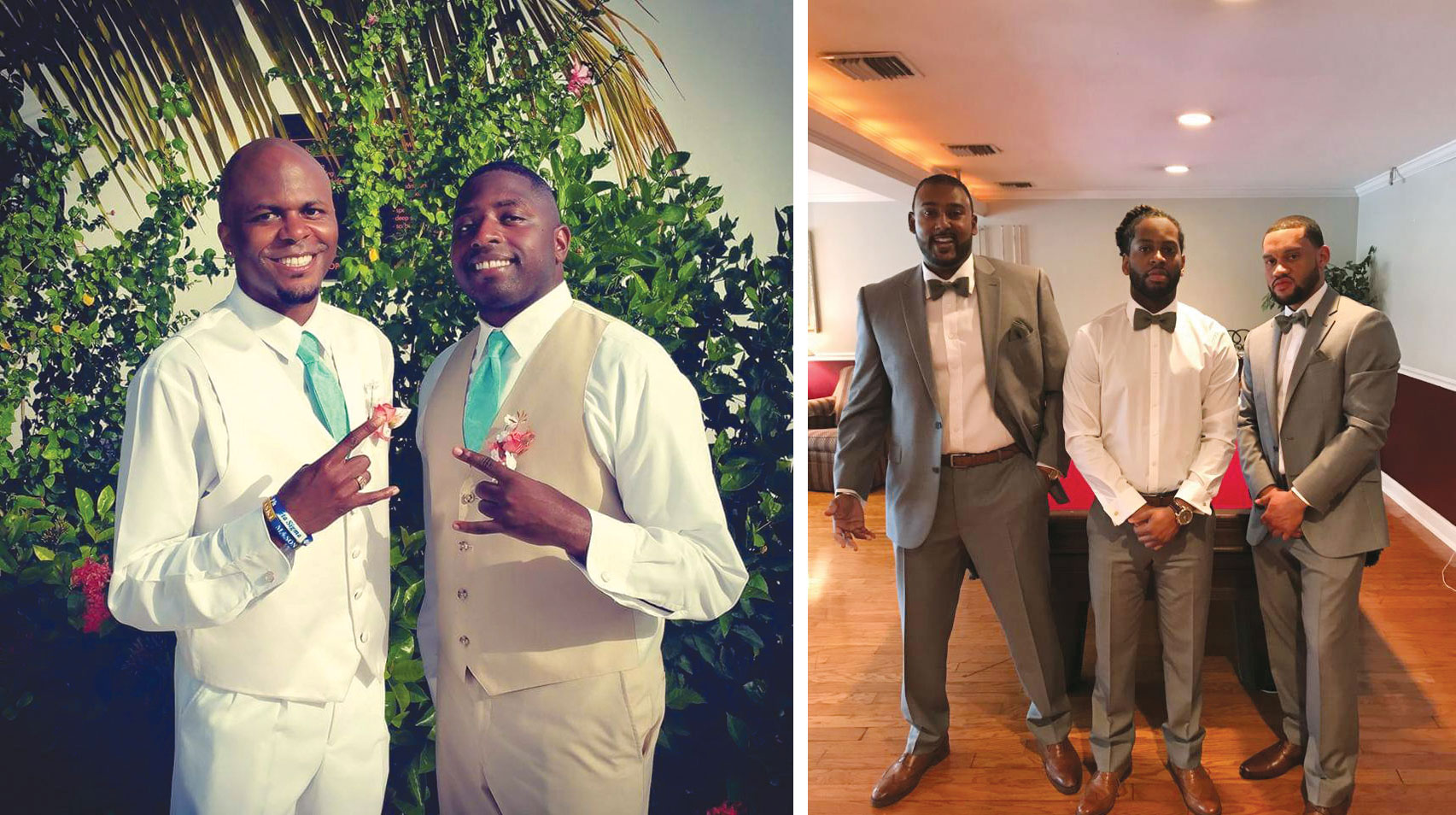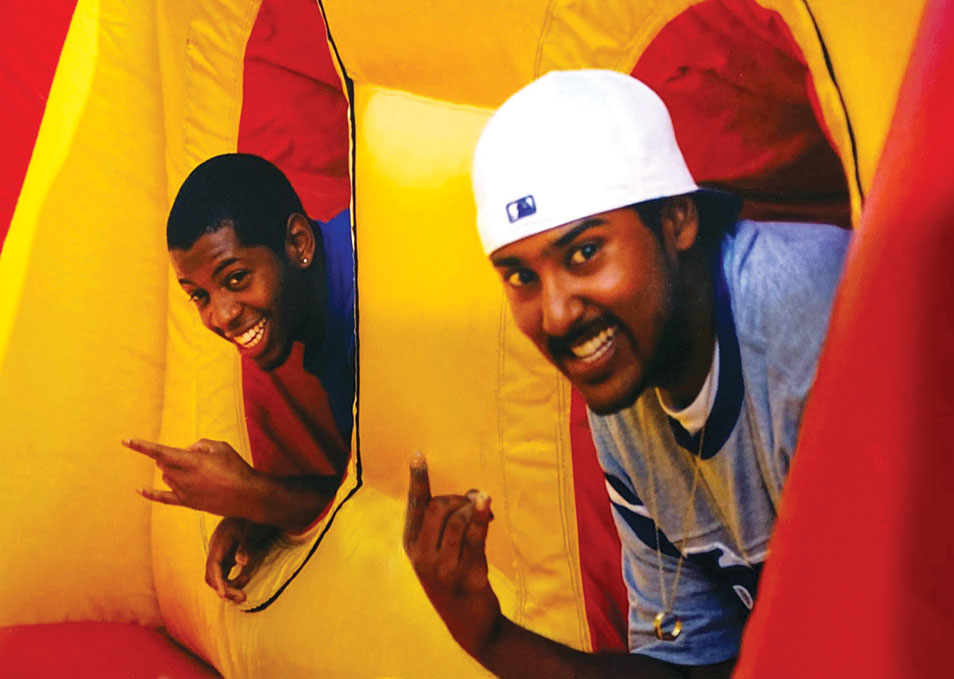Published: December 09, 2020
A Life-Changing Legacy
Five fraternity brothers help a minority student fund their education.
By Janet Siroto

Left to right: Marlon Hanley ’06, Jamal Wilburg ’06, David Ramnarine ’09, Michael Williams ’09 and Devin Derenoncourt ’09. Photos courtesy of Jamal Wilburg ’06
College friendships: Those two words describe some of the most wonderful memories and lasting bonds of many people’s lifetimes.
That surely is the case for five brothers at UT’s Alpha Beta Gamma Chapter of Phi Beta Sigma Fraternity Inc., who connected and have stayed close since their Spartan days. From cleaning up campus after a huge storm to encouraging people to enroll in the national bone marrow registry, service has always been a core value for the five best friends: Marlon Hanley ’06, Jamal Wilburg ’06, Devin Derenoncourt ’09, David Ramnarine ’09 and Michael Williams ’09.
Fun played a major role, too — whether hanging out in the Vaughn Center or meeting up at dances and sporting events. That feeling of having found your circle permeated everything they did.
As Black students, they were especially aware of always having each other’s backs. “The UT minority community is very supportive,” says Ramnarine, who is associate director of financial aid at UT. “For instance, when I was a student and was looking for a job, Jamal heard I needed work. He introduced me to the UT Media Services department, where I wound up working for almost four years.”
It’s no surprise that after creating that kind of support system and cache of memories together, the friends have stayed bonded, serving in each other’s wedding parties and attaining godfather status for one another’s children.
Looking Forward, Giving Back
Over the past decade-plus of pal-hood, they realized there was something else they shared. Each expressed the desire to give back to UT, which had set them all on a path to personal and professional success.
“During our college years, we were always looking for ways to contribute and make the world a better place,” says Wilburg, who is associate vice president of customer and technical support at Ability Network in Tampa and spent 12 years in the U.S. Army Reserve. “After graduation, I had been wondering how to give at a higher level and increase representation of minorities.”
Attending recent events on campus with his wife spurred him into action. “It was hard for me not to notice that I was often among very few other Black attendees,” he says. “That was really on my mind, especially over the last year.”
In chatting with his friends, he recognized they all shared the goal of supporting minority students at UT. Working with the Office of Development and University Relations, they pooled their resources to create the Alumni Bridging Gaps Endowed Scholarship to help a first-year minority student fund their education.
The idea of providing a scholarship of this sort resonated deeply with the friends. “I myself was a scholarship recipient,” says Ramnarine. “I don’t know if I could have made it without that help, so I wanted to be part of something that would help students similarly in need.”
“I remember feeling really up against the clock to get my financial package together,” adds Derenoncourt, a correctional investigator with the New York City Department of Corrections. “It’s exciting to help future students get across the finish line and afford their education. To help someone with the desire to attend UT but not the resources is very inspiring.”
Funding Those Who Come First
The scholarship can play an especially powerful role for a first-generation college student. “That was my case, charting my own path, getting the highest degree in my family,” explains Williams, who works as an advanced practice registered nurse in New Haven, CT. “It’s a great feeling to be able to build a legacy. The scholarship lets other students in that situation know there are people who came before them and are saying, ‘You can do this!’ It validates them and reinforces their drive.”
Hanley, a dentist in Houma, LA, was drawn to the idea because it also builds on the principles of their fraternity. “The idea of giving someone a chance to attend UT and experience what I did is tremendous. Combining scholarship and service is personally very meaningful — those are pillars of our fraternity.”
Reaching for a Ripple Effect
What’s more, the fraternity brothers want their vision to encourage the Spartan alumni community to give back. “I hope this will be a call to action and inspire others to be active and mentor students,” explains Ramnarine.
Wilburg echoes this: “To see a student be able to go to the college of their choice, not the college of their circumstances — to get those benefits from UT that we all enjoy — that will be wonderful,” he says. “We’d love to see other groups step up. Our goal is to have this be more than just us.” Spoken like true Spartans!
Campus Camaraderie

Michael Williams ’09 (left) and David Ramnarine ’09 (right) at a fair to support foster children in 2006. Photo courtesy of David Ramnarine ’09
The five fraternity brothers who bonded so strongly on the UT campus and created the Alumni Bridging Gaps Endowed Scholarship have stayed incredibly close over the years. They’ve celebrated weddings together and regularly watch ball games virtually while group-chatting. Here, we asked them to share their favorite moments that cemented their bond as Spartans.
- “For me, it was our ‘So You Think You Can Dance’ event. It brought together older fraternity members and brand-new ones. That fraternity bond is powerful: We communicate honestly and hold each other accountable. So, coming together as that big group, doing our dance in unison (called ‘strolling’), was such a ‘wow’ moment for me.” — Michael Williams ’09
- “I can’t pick one. So many meaningful times, so many fun times. The combination of service and social events was so special for me.” — Marlon Hanley ’06
- “We did what we called a Healing Hands event for a center for abused women. We set up a table, a big banner and paint; people would do a handprint on the banner and write a supportive message, bringing positivity to the women dealing with domestic violence.” — David Ramnarine ’09
- “Being out and about in the Vaughn Center lobby. What a great sense of community!” — Devin Derenoncourt ’09
- “One of the strongest memories for me is how we organized and did a campus cleanup after the 2004 hurricane. We were always looking for ways to contribute and make the world a better place through service.” — Jamal Wilburg ’06
